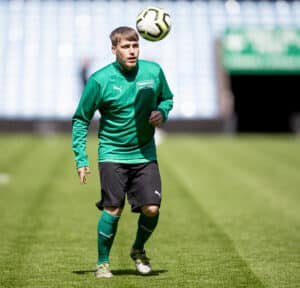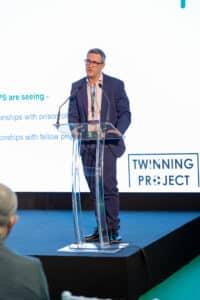 BBC News
BBC NewsBorrowing was £17.4bn last month, the second highest October figure since monthly records began in 1993.

Twinning Project CEO Hilton Freund is changing the lives of UK prisoners by giving them employability opportunities in football, writes Christopher Jackson
The great and the good of football are filing into Downing Street: representatives of the charitable foundations of the likes of Manchester United and Arsenal – clubs famous the world over. At Number 10 they’re eager to disabuse you of your mobile phone the moment you arrive but it isn’t personal. Myles Stacey OBE, the special advisor who takes us up to the meeting room, points to a cubby-hole next to the Cabinet room and says: “Ministers have to put their phone in there before a Cabinet meeting so you’re not being singled out!”
That means the discussion upstairs isn’t recorded, but it’s a remarkable occasion, convened by the likeable Hilton Freund, the Chief Executive of the Twinning Project, an organisation which uses football to help rehabilitate prisoners into jobs.
Around the table on that day, the possibility of football as a force for good in local communities is repeatedly brought home. The central fixture of your local area used to be your church – now it’s the football stadium. I note time and again in the contributions an admirable sense of responsibility towards those who have been unfortunate enough to choose a life of crime.
Afterwards, I ask Freund how is involvement in The Twinning Project began. “I have known [Twinning Project founder] David Dein a long time. David was the former vice chairman of Arsenal and he was vice chairman of the FA: he currently still advises FIFA and UEFA on a number of initiatives. After David left Arsenal FC he began public speaking and doing motivational talks. He started primarily in schools and then moved into the prison environment: he just felt that football could do more to create employability opportunities. He reached out to me in 2018 and asked me get involved.”

Dein’s initial approach to Freund came in early 2018; by October 2018 the Twinning Project had launched. So did Freund come on board as a CEO figure? “Not at first. Once we launched, we quickly recognised that some of the non-premier league clubs would need financial support in order to do this. We knew we had a responsibility to raise funds to help them, so we set up our own charity which was incorporated in mid- 2019: at that point I became the official CEO.”
Thinking back to the Downing Street event I recall how many of the clubs’ foundation heads complained about the perception that the whole of football is rolling in money. This may be the case when it comes to the eye-popping player salaries we all read about, but it doesn’t mean that the charitable arms of those clubs have ready access to cash. Was all this factored in at the inception of The Twinning Project or did it come as a surprise? “We were acutely aware of it very early on,” explains Freund. “There is a clear division between the club and the community trust or the foundation: the money that swills around the premier league doesn’t become a pot with which to carry out football-based provisions in the community.”
So how is the Twinning Project funded? “We are a sports-based intervention into criminal justice. We have received little from the Ministry of Justice. We have secured some funding from local police and crime commissioners and from some local charities. But mainly we’ve sought to raise funds through some big events, such as an audience with David Dein and Arsene Wenger. We are a national charity so what we find is we prefer our events to raise unrestricted money and unrestricted funds: these are what helps cover my overheads which are significant.”
Those overheads tell you about the scale the organisation which Dein and Freund have built in a brief period of time: “I’ve got staff all over the country who are essentially project managers. If you can imagine, I’ve got a guy in Manchester and he looks after 20 clubs and 20 prisons. I’ve got a similar guy in London who looks after 20 clubs and 20 prisons. They all need taking care of.”
Does Freund have access to the players’ help ? “Access to the players is actually limited,” Freund says. “Access to the club ownership is easier than access to the players.” Why is that? “The players are restricted: they have got a number of initiatives that the clubs have themselves which tend to take priority. What we don’t want to do is compromise our relationship with our football club partners because it’s putting pressure on them to make players available. To date, although our relationships are rich and very warm with football, we are very careful about how we activate our player engagement.”

So what exactly does the Twinning Project do? “The idea of football in prison is not new. It’s been happening for years that football clubs go into prisons, but it’s been spasmodic: what we wanted to do is to offer a sustained consistent delivery. What we were seeing was football club representatives going into prison, having a kick around and then leaving and not going back for six months or a year. That’s why we approached The Football Association to create the FA Level 1 coaching qualification which can be delivered in the prison environment.”
So where can that journey take prisoners? “On completion of the course, prisoners can achieve Level 1 certification which puts them on the ladder to further football-based education should they choose to go that route. It’s the first step to education, but the important thing is they’re beginning to upskill and engage with a football club at the same time: they are actually on a big interview as well. So when they are released from prison, the football clubs have experience of working with those prisoners, making them that much more employable by those organisations.”
What’s fascinating is the variety of roles which prisoners end up doing. Freund lists the possibilities and you can see how passionate he is about the potential range of positive outcomes: “I’ve got guys working as coaches – but I’ve also got guys working as stewards on match day, baristas in the coffee bar, as barmen in the club, or in maintenance roles. 70 per cent of prisoners leave prison without a job. It should be no surprise that 65 per cent reoffend in the first year. But if they have got some work and the stability which comes from engagement with a big brand like Everton, Manchester City, Arsenal, Plymouth Argyle, you are less likely to reoffend.”
For Freund then, employability is the key metric in driving down reoffending. “Those in criminal justice will tell you there is a couple of things that prevent people from reoffending. The first one is their age. For people in their late teens and early twenties, when you are in a gang, going to prison is deemed a badge of honour. The second thing that prevents people going back is a stable relationship: if you have a wife and children, or supportive parents, you’re that much less inclined to want to go back in. Sadly, a lot of people are victims of inter-generational criminal activity. If your mother or father has been to prison there is a very good chance you are going to prison too. But lack of a job upon release is another – and that’s what we’re committed to tackling.”
Do any of the prisoners go through Freund’s programme and decide that football isn’t for them, but then go into some other form of business? Freund answers in the affirmative. “I have got a great example of a young man at Lincoln City who wasn’t into football but he was in prison when Lincoln City visited: he is now studying accountancy though the Lincoln City Foundation. We recognise that not everybody loves playing football but everybody understands the power of football brands: we mustn’t lose sight of the fact that this is not just a football-based provision.”

This makes me wonder whether Freund would consider broadening the Twinning Project to include other sports? “My sweet spot is football,” he replies. “Nigel Wray, the owner of Saracens Rugby Club, sits on my board of trustees – we have entertained the idea of engaging with rugby.” The trouble, he says, is that football is so much more powerful: “Nothing really rivals the level of passion you get with football. When you consider the lack of money with the football club foundations which sit alongside very rich football clubs, the case becomes even harder with other sports. Take cricket as an example. Even at Lords they struggle to make money: to work with other sports codes would increase our funding exposure. It’s a real challenge.”
The Twinning Project is now impressively expanding its football offering into the US, where soccer is the fastest growing sport. This prompts some interesting reflections on the difference between UK and American prisons. “Let me tell you something: you don’t want to go to prison in the US. Prison for me should be rehabilitative. In the UK, it is: your punishment is the loss of your liberty, and you are being prepared on day one for the day you get out. In the UK prison system, you can work, you can study, you can do sports-based activities, and you can go to the gym.”
And in America? “You go to prison in the US and there are 80-90 men in a dormitory three bunks high. There is no privacy. Locking prisoners in a cell for 23 hours a day is not going to rehabilitate anybody – it’s going to make them angry. We have to work with these individuals to create an environment of nurturing, learning, skilling, and improving these people for when they come out. I was on Rikers Island in New York. You don’t want to go to prison there: it’s another level.”
And what’s the reception been like in the US? “We work with an organisation called the International Prisons & Corrections Association,” explains Freund. “We have made a presentation to them and, off the back of that, we were given the opportunity to speak to the heads of prisons commissioners and deputy commissioners across the US. There are 50 states, and we have pitched to over 20, and 14 loved the idea. But you’ve got a federal system: what’s going on in California is very different to what’s going on in New York or Texas. US prison reform is a political hot potato around which elections are won and lost.”
And where next? Has Freund got a 5-10 year plan? “We are currently in advanced conversations with South Africa; we are in conversation with Roma football club in Italy. We have been approached by Australia. The only thing holding us back is money: I can’t be in a million places at once but what we have managed to do is come up with a provision in the UK which we can be very proud. There are 92 football clubs in the football league; currently 73 are engaged with the Twinning Project.”
That’s an incredible achievement and could only have been achieved by passion: “As you can tell, I am hugely passionate about this. I eat, live and breathe it.” He certainly does – and his story is a marker about what can be achieved with that passion – and a window also into the way in which our collective passion for football can be leveraged for good in our communities.